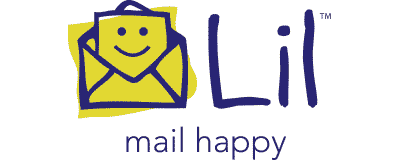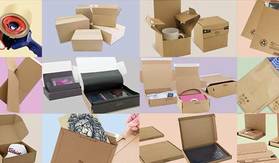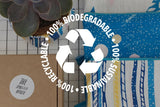
Plastic Pollution and Online Business - an optimistic look to the future
Sometimes it seems as though you can’t switch on the TV or listen to the radio without being told just how bad single-use plastic is for our environment. We can feel bombarded by all the negative news. Barely a day goes by when I don’t feel guilty about how I’m contributing to the destruction of the Earth and condemning future generations to havoc and pollution.
“I was just trying to give my child the party of their dreams,” I hear you say, having realised that the copious amounts of plastic drinking straws, coffee cup lids, cling film, balloons and more that should have been relegated to the annals of history is now making its way to the local landfill site via "Mr Squashy’s soft play extravaganza".
Change is happening
However, in the midst of this backlash against plastics, there’s surprisingly much to be positive and optimistic about. So many of us are now striving for and effecting change; there are the environmentalists and activists at the very centre of single-use plastic reform like David Attenborough, Liz Bonnin and Greta Thunberg; then there are countless others, not necessarily in the public eye, but still sensibly championing alternative ways of being a consumer, ways that are realistic, attainable and most of all, kinder to the environment.
And it’s very easy for us to see how much our mind sets have shifted in a matter of a couple years and consequently, how much progress has been made.
Here are just a few examples of action that is being taken to reduce plastic from our environment:
U.K. supermarkets have ditched single-use carrier bags and are committed to reducing their consumption of single-use packaging https://www.bbc.co.uk/news/uk-49674153;
Schools are regularly and conscientiously educating their students on the impact of plastics on the environment https://www.sas.org.uk/plastic-free-schools/;
Boots has dedicated itself to removing plastics from in-store and online orders https://www.theguardian.com/business/2019/jun/24/boots-to-ban-plastic-bags-brown-paper-carriers;
Hotel Chocolat has pledged that, “100% of our packaging will be compostable, reusable or recyclable by 2021.” https://www.hotelchocolat.com/uk/engaged-ethics/our-planet/packaging.html
Imagine one garbage disposal truck tipping its entire contents into the ocean EVERY MINUTE.
Progress aside; let’s take a look at the facts. Why is single-use plastic so damaging to the environment and why should we, as individuals and as businesses, strive for immediate change even if some global corporations are not?
Annually, it’s estimated that about eight million tonnes of plastic end up in the world’s oceans. Regarding plastic packaging, 32% of the 78 million tonnes produced every year flows into our seas and it’s highly likely that this figure will increase. To appreciate this amount fully, imagine one bin lorry (aka garbage truck) tipping its entire contents into the ocean every minute. Now increase this to two bin lorries per minute by 2030.
By 2050, there will be more plastic in the ocean than there are fish.
If single-use plastic keeps being dumped into the sea unabated, oceanographers estimate that, by 2050, there will be more plastic bits in the sea than there are fish. And it isn’t just the sheer amount that’s worrying, it’s also the impact that it has on wildlife such as marine birds and animals, many of whom become poisoned by or tangled up in it.
Even in the remotest and deepest parts of the ocean, high concentrations of micro-beads, plastic micro-fibres and broken-down plastic particles have been found; these are almost impossible to remove from the ocean and - as we’ve come to realise – they’re so small that they’re easily ingested by sea creatures and often via them, by us. Plastic pollution isn’t, of course, limited to our oceans; it also impacts our lakes and rivers, our green spaces and our countryside.
But how does all this plastic end up where it shouldn’t? Mainly, it’s due to land-based waste being mismanaged, either because it remains uncollected or because faulty waste management systems leak. Even when single-use plastics are sent to landfills correctly they aren’t harmless. Landfill liners can leak harmful pollutants into the watershed and a lot of plastic dumped on the top of sites is carried away by the wind. Single-use plastic therefore, though incredibly cheap and easy to manufacture, causes a lot of expensive damage as a waste product.
Often, as consumers, we’re told that the responsibility lies with us; we buy this stuff after all, so we have a duty to recycle it so it never reaches landfill in the first place. As prudent as it might be to invest in effective waste management of plastic worldwide and to encourage everyone to recycle, this will never eradicate the problem. It can’t when so much plastic isn’t able to be recycled in the first place. https://www.sciencefocus.com/science/why-are-some-plastics-recyclable-and-others-are-not/
We need sustainable alternatives to plastic that are compostable and recyclable.
As a business, Lil Packaging feels strongly that a vital part of the solution is to manufacture viable alternatives to plastic, alternatives that are fully reusable, easily recyclable and compostable. Read on, if you are in any doubt.
In 2016, world plastics production totalled around 334 million metric tonnes and here’s the killer, roughly half of that annual amount was destined for single-use products. Fast-forward to 2019 and it has been estimated that around four trillion plastic bags are still used worldwide every single year, with only 1% being returned to be recycled.
In the U.K., it’s estimated that we use around 40 million plastic bottles daily, routinely recycling only 20 million. Worldwide, 500 billion disposable cups keep us caffeinated each year. The problem is that many of the cups contain Styrofoam and Styrofoam – yes, you’ve guessed it - cannot be completely recycled.
It’s a sobering thought that much of the Styrofoam disposed of today will still be present in landfills 500 years from now. One of the reasons plastic production is booming is a result of the demand for eCommerce packaging. Plastic packaging – which includes plastic wrap, bubble wrap, polybags, mailbags, plastic tape, etc. - made up 42% of all non-fibre plastic produced in 2015 and shamefully, it also made up 52% of plastics thrown away. This figure has kept rising year on year.
If you have an eCommerce business, then it’s vital you take action now to reduce your plastic footprint and deal with this dilemma instead of passing it onto your customers. At Lil Packaging, we’re all too aware that some of our products have short lifespans and so we’ve made a commitment to phase out single-use plastics, not only from our range of products, but also from our operations. This includes removing all mailbags, bubble mailers, plastic eCommerce tape and reformulating inks and glues.
We only use FSC certified cardboard and environmentally friendly inks. As a packaging company, we’re also aware that our products need to be robust, tamper resistant, waterproof and attractive. Yes, they need to be plastic-free, but they must also get the job done and be cost effective; this is where our innovative design approach and exhaustive research comes into its own.
Already, we’re building a reputation for ourselves as a business that’s enabling single-use plastics to be removed from the world of eCommerce and that’s something of which we’re very proud; we want our name to be synonymous with plastic-free and ocean-friendly packaging. To that end, we've been working tirelessly with the Internet's biggest retailers, helping them make the switch to plastic-free packaging. So far we've played a part in preventing 1000s of tonnes of single-use plastics from ending up in landfill and our oceans. Additionally, we've recently switched Europe's largest Internet retailer over to our entirely plastic-free Lil envelopes, produced using 100% biodegradable recycled fibreboard.
So, all is not lost, we don’t have to abandon hope yet.
We should listen to Mr Dylan and heed the call - the times, they really are a changin’. As consumers, we can join the many others also doing their bit to reduce disposable plastic consumption; we can make it a habit to drink from reusable water bottles, buy shopping bags that are built to last and refuse plastic straws. As conscientious business owners, it’s not enough just to remove all single-use plastics from our offices or factories; we have to provide cost-effective, feasible alternatives. And it is possible! Follow our lead and commit to eradicating plastics from eCommerce. If we all keep tackling this issue at a grass roots level, starting with our own lives and livelihoods, the anti-plastic movement will maintain its momentum and cannot fail to become a catalyst for change on a much wider, far-reaching scale.
Oh, and by the way, if you’re wondering how to give your child the party of their dreams whilst at the same time keeping their dreams of a beautiful world alive, check out https://thepaperpartybagshop.com/ :-)
___
More on why we should ban single use plastics.
Read more about the progress we've made towards removing plastics from eCommerce.




Leave a comment